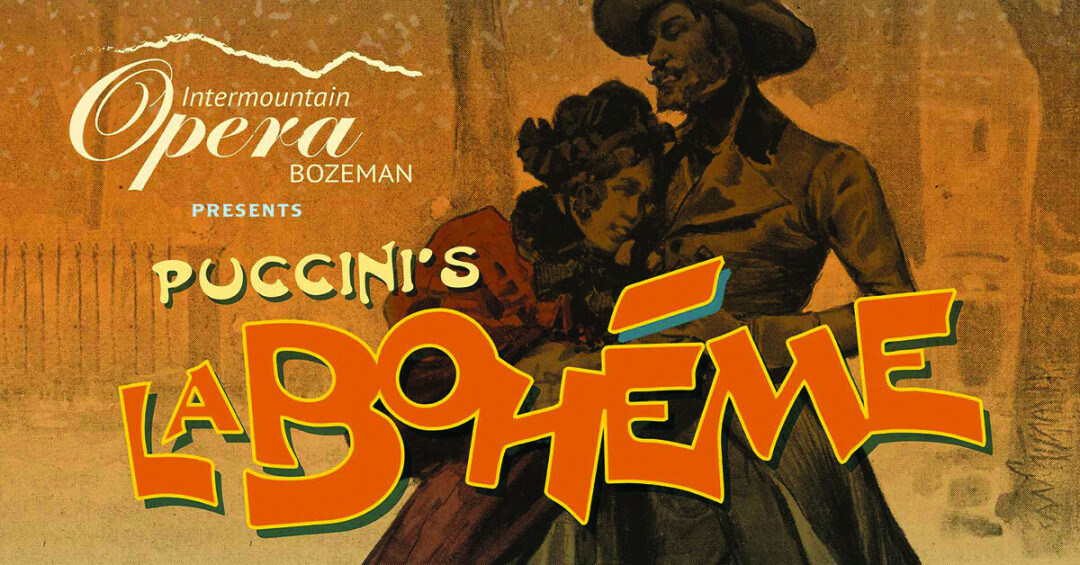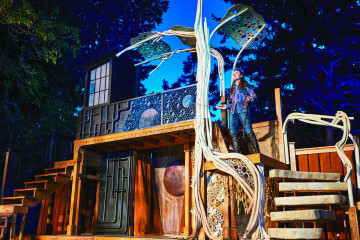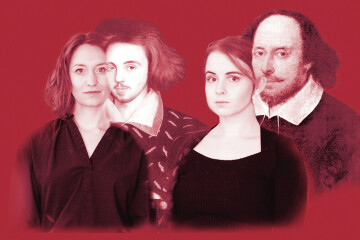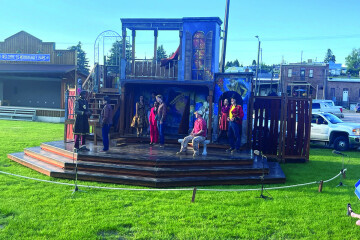Onstage in Bozeman

April presents some great opportunities to experience a wonderful mix of theater and music in Bozeman. This article gives a quick glance at The Bozeman Symphony, The Ellen Theatre, Bozeman Actors Theatre, and Intermountain Opera, all producing some fantastic entertainment this month. Happily, there is not much overlap between these performances, so you can easily take in all four shows.
The Bozeman Symphony performs Edward Elgar’s “Enigma Variations,” along with Adolphus Hailstork’s “An American Port of Call,” and Nigel Westlake’s “Spirit of the Wild” on April 13 and 14 at the Willson Auditorium.
Guest conductor Chelsea Gallo leads the audience on a musical journey that introduces a colorful cast of characters. Elgar composed his Variations between October 1898 and February 1899 as a musical reflection on fourteen of his close acquaintances, including his wife and himself. The “Enigma Variations” are not ‘portraits’ of these friends, but rather a collection of variations on a main theme. Each theme contains a specific and distinct idea based on a particular personality, or perhaps on an incident known only to two people.
The Symphony’s concert begins with Adolphus Hailstork’s “An American Port of Call,” which premiered in 1985. Hailstork, a contemporary American composer, based this piece on Norfolk, Virginia, capturing the energy of a busy American port city.
Australian composer Nigel Westlake based his “Spirit of the Wild” concerto on a visit to Bathurst Harbor in the beautiful Tasmanian wilderness. This piece is written specifically for an oboe player, and Bozeman Symphony’s Sandy Stimson, their principal oboist, takes center stage to perform this piece.
The Ellen Theatre presents Tennessee Williams’ The Glass Menagerie from April 5 through April 14. The Glass Menagerie is known as a ‘memory play,’ painting a haunting picture of desire, desperation, and hope. It has become known as a semi-autobiographical portrait of Tennessee Williams himself, with the character Amanda Wingfield standing in for his mother, and Tom Wingfield as Tennessee Williams. The glass unicorn represents fragility, rarity, fantasy, and almost-unattainable beauty, as seen through Laura, Tom’s sister.
This production is reimagined through the direction of Connor Berkompas, seen before on Bozeman stages through his company, Nervous Theatre. The Glass Menagerie was the breakout hit that brought fame and fortune to Tennessee Williams, and launched his famous career as one of America’s best playwrights. The Glass Menagerie has been revived on Broadway more than any other play in the last 75 years.
Bozeman Actors Theatre presents a dramatic reading of T.S. Eliot’s famous play Murder in the Cathedral on April 19 and 20, at the Holy Rosary Church in Bozeman. Directed by Mike Beehler, Murder in the Cathedral tells the story of the murder of the Archbishop of Canterbury, Thomas Becket (played by John Hosking) in 1170 at the behest of King Henry II of England. Staging this play at Holy Rosary Church allows one to feel the resemblance to a cathedral, simulating the actual scene of the crime.
T.S. Eliot was commissioned to write this play in 1935 by the Bishop of Chichester, as the rising tide of fascism was sweeping Europe. Eliot wrote Murder in the Cathedral as a provocative verse-drama, raising profound questions for us today related to issues of church/state relations, populism versus nationalism, temptation, pride, and redemption.
King Henry II famously said of Thomas Becket; “Will no one rid me of this meddlesome priest?” Four knights overheard Henry and, hoping to please their king, left immediately for Canterbury Cathedral and murdered Becket at the altar. The murder of Becket quickly became a notorious crime, and Henry — in order to pacify the citizens of England and preserve his kingship — undertook a pilgrimage to seek forgiveness. As penance for the murder, Henry walked barefoot through the streets of Canterbury wearing a sackcloth rather than his royal robes. Reaching Becket’s tomb, he was beaten by monks and spent the night with no food or blankets on the Cathedral floor, praying for forgiveness.
As a proof of how this nearly 100-year-old play and 854-year-old murder is relevant today, consider how on June 8, 2017, Thomas Becket made a surprise appearance in the investigation into possible Russian interference in the 2016 presidential election. Former FBI director James Comey had been summoned to appear before a hearing of a Senate Intelligence Committee to provide “texture and context” about his interactions with President Trump. About an hour and 40 minutes into proceedings, Maine Senator Angus King asked Comey about Trump’s “hope” that Comey would stop the investigation of General Michael Flynn, the disgraced former national security adviser — at which point Comey made a pointed reference to Becket’s martyrdom:
King: “When a president of the United States in the Oval office says something like, ‘I hope’ or ‘I suggest’ or ‘Would you?’, do you take that as a directive?”
Comey: “Yes. Yes. It rings in my ears as kind of ‘Will no one rid me of this meddlesome priest?’”
Intermountain Opera is performing La Bohème from April 24 through 28, at the Ellen Theatre. La Bohème was composed in 1896 by Giacomo Puccini to an Italian libretto by Luigi Illica and Giuseppe Giacosa. This opera was based upon a collection of vignettes written by Henri Murger in an 1851 novel called Scenes of Bohemian Life. La Bohème, a classic tale of tragic romance, is a great opera for beginners and regulars alike.
Puccini’s La Bohème, one of the most famous operas ever written, follows the story of two young bohemian lovers living in Paris in the 1830’s. When the poet Rodolfo meets seamstress Mimì, it’s love at first sight. But faced by the cruel realities of poverty and ill health, it is uncertain if their love will survive, or whether the strength of their youthful passion will withstand every tribulation that life can throw at them. With this great love story comes a beautiful score, including arias like “Musetta’s Waltz” and “Yes, they call me Mimì.”
The world premiere of La Bohème was in Turin, Italy on February 1, 1896 at the Teatro Regio, conducted by a young but soon-to-be famous Arturo Toscanini. Ever since, La Bohème has become part of the standard Italian opera repertoire. Today, it continues as one of the most frequently performed operas worldwide.
La Bohème also served as the inspiration for the famous musical Rent, by Jonathan Larson, which premiered in 1996. In Rent, lovers Roger and Mimi are faced with AIDS, and progress through the action with songs such as “Light My Candle,” which has direct reference to La Bohème. Many of the character names in Rent are the same or similar to those in La Bohème, and the musical at times references “Musetta’s Waltz,” often considered the greatest song in La Bohème.
For more information about any of these productions, please refer to their
organization’s websites:
www.intermountainopera.org





